We get tons of questions about tile on gunite swimming pools in Michigan, so we’ll tell you about several common issues that homeowners face.
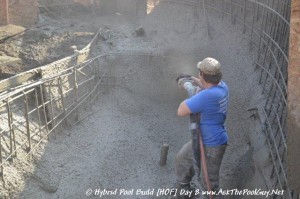
When a gunite pool is “shot” or built, the gunite forms the pool in one continuous shell. The pool is then finished on the interior with a marcite, pebble, or other decorative finish. The tile line at the top of a gunite pool serves as a cosmetic finish. Since the pool water level will fluctuate throughout the season, if it were left as just the marcite or pebble finish it would result in a “bathtub ring” at many different levels.
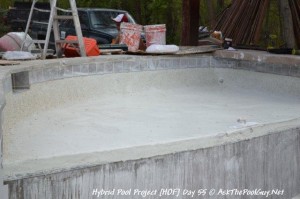
The tile serves as a surface that helps to hide this unsightly water line. Here’s where it starts to get interesting. We are in the Michigan market, which means for 6 months of the year, the conditions are not conducive to swimming, and most pools are closed and winterized for the fall and winter months. Tile that is installed in Michigan should always be at least frost resistant. Even when the tile is applied perfectly, and frost resistant tile is used, we do see tile falling off swimming pools, and cracking in some cases.
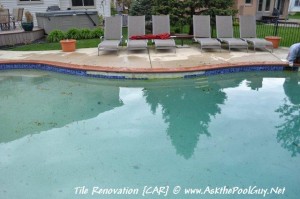
Many of the pool tile jobs that we are quoting here in Michigan this year have evidence of beam shear behind the tile. What this means is that the ground movement that occurs during the freeze/thaw cycles in Michigan, or for other reasons has moved significantly and pushed the top of the gunite pool, known as the beam, resulting in a structural crack. This normally appears behind the tile (which can be seen in many cases where the tile has fallen off of the pool) as a horizontal line that travels either a short distance along a pool wall, or in some cases around the entire perimeter of the swimming pool. Once this occurs, there are a few things that can be done. Once beam shear is present, even with a tile redo, the underlying problem still exists. The beam could be redone if a homeowner desires, however, this would need to be done at the same time that the pool patio, coping, tile, and interior finish are redone, so it is a costly renovation to undertake.
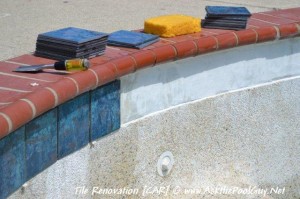
Another solution is to perform a tile renovation, including grinding down the surface behind the tile where the beam shear is present, reform the new base for the tile to adhere to, and install new tile. We recommend installing new 6×6 tile if this is the case for a few reasons. The first is that there are less little pieces of tile, in case the problem reoccurs the fixing of larger tiles will be simpler to undertake. Another reason is that if the surface for the tile becomes uneven, and small tiles are chosen such as the patterned or 2×2 tile, there are many more grout lines to contend with and you may notice some of the shifts in the tile line.
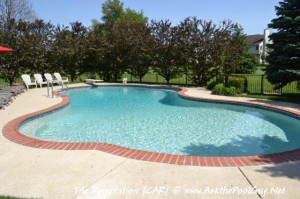
The result is a pool that has a new and updated look, as well as updated function behind the tile. It is still possible that during the subsequent seasons there will be some tile shifting as the ground moves, but we’ve done everything we can to ensure the best possible performance of the pool tile for the future.
Here are a few before and after photos of a gunite pool with the beam shear and small tile pieces that updated their pool and look with new 6×6 decorative tile and achieved a fabulous look!
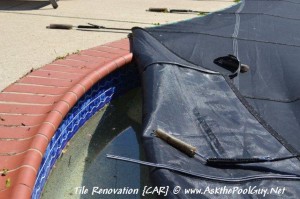
- Pool with Beam Shear Evidence behind the tile that keeps falling off into the pool each year.
